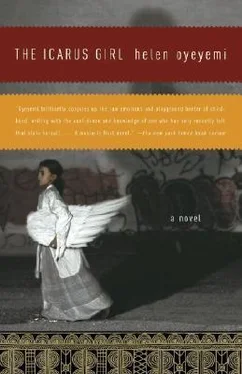But Jess was looking over Dr. McKenzie’s shoulder, at where TillyTilly was moving an egg-shaped glass paperweight around on his desk. When Jess caught her eye, Tilly shook her head sorrowfully, but said nothing.
“What’s an alter ego?” Jess asked abruptly, her eyes still on Tilly.
“It’s. . a different side to you that you normally keep hidden because it only comes out when you’re scared or angry,” Dr. McKenzie told her.
“So you mean. . when Jess screams, and when she breaks things, that’s a side of her that she calls TillyTilly?” Sarah broke in.
Dr. McKenzie nodded briefly.
“My father would die laughing,” Sarah added after a stunned silence.
TillyTilly was now sitting on the floor beside Dr. McKenzie’s chair, pulling a Jelly Baby apart and rolling the bits into little balls between her fingers.
(TillyTilly, don’t, you’ll make a mess.)
“You know you’re wrong, don’t you?” Jess informed Dr. McKenzie, as grandly as she could. But her knees were jiggling up and down with fear. Oh God, what if he was right and she was just this mad, mad girl who did things that she couldn’t control?
“Sometimes we do things that we don’t like and that we can’t understand, Jess. It’s possible that all TillyTilly means is that part of your mind, say, the part of you that can show you’re angry in a reasonable way, hasn’t developed as quickly as other parts, like the part of you that likes reading lots of books—”
He paused and his brow puckered as he looked at the little green balls of dismembered Jelly Baby at his feet before scooping them up.
“Listen, Jess, we can talk about this more later, but I just wanted you to know this so that next time you see TillyTilly coming, you can remember that she doesn’t have to be there.”
She doesn’t have to be there . That’s what Shivs had said, too. What was wrong with everybody?
TillyTilly threw her arms around Jess’s shoulders, hugging her close.
“I do have to be here, you need me,” she whispered in Jess’s ear, and Jess was aware of trying not to shrink from Tilly’s touch so as not to make her angry and she wished that sound (hmmmmmmmmzzzzzzzz) wasn’t rocking through her and making her feel faint. Dr. McKenzie thought that he knew what TillyTilly meant, but he was wrong. Nobody knew what Tilly meant, and nobody knew what Jess meant either, though with Jess, they could if they really wanted to.
“Please don’t talk to TillyTilly again,” Sarah begged, as they got on the bus to go home. She was flustered paying the bus driver, and dropped her gloves, floundering to pick them up until Jess snatched them up for her. On rising, Jess was surprised to see that Sarah’s eyes were filled with tears. Not knowing what to say, Jess took a seat by the window and stared out, unseeing, at the houses and shops and cars moving past.
Sarah sat down beside her and squeezed her hand.
“Think of it like not speaking to a normal friend. She can’t make you play with her.”
Jess began to drum her feet lightly on the bus floor as she tried not to listen to the pleading in her mother’s voice. She tried, instead, to imagine how she really could have done these things herself. She saw herself kicking the computer, pushing it off the table, making sure it was broken beyond repair because she hated her mother.
And the mirror. Could she really have taken it off the wall and flung it to the floor so that the glass sprayed out in jigsaw-puzzle pieces, then calmly put the empty frame back on the wall, at an angle?
And not remember ?
The trouble was that, with TillyTilly, it was possible.
Possible, but not true, she decided.
“Jess. Promise me?”
Silence.
“Jess? Please. It’s already hard with your father being poorly—” Sarah’s voice was rising out of her control, and Jess flinched a little bit, embarrassed.
“Yeah. OK,” she mumbled, noncommittally. Everyone acting as if she had a choice. But she wasn’t the fairy; she wasn’t.
“OK what?”
“OK I won’t talk to her.”
Oh, Shivs, why did you have to tell? You are a bad friend. Good friends don’t tell secrets like that. Why is TillyTilly always right?
Jess would be nine on July the twenty-fifth, during the school holidays.
“We were wondering if you’d like to spend your birthday in Nigeria,” her mother said brightly as Jess chopped the crust of her toast up into little, little pieces at the kitchen table.
We?
Jess looked at her father, who was wearing a T-shirt, pyjama bottoms and a belted dressing gown and propping himself up at the table with his elbow. His cornflakes had descended into a pool of mush before him, and he seemed to have been reading the same two lines of the morning newspaper over and over again, his lips moving slowly as his finger traced the lines of print. His chin was covered with thick stubble that was spreading up his cheeks.
His hair looked a mess. Jess didn’t think he’d brushed it for ages.
She worried about things like this — him not drinking or disposing of his own coffee, him not smiling, him looking so tired all the time but not sounding like he meant it when he said so, him not brushing his hair. He didn’t look like part of the “we.”
What would he be like in Nigeria?
What would her grandfather say?
He’d probably look straight at her with those keen, sparkling eyes and know that it was Jess’s friend who had done it, and therefore Jess’s fault.
She wouldn’t be gold anymore, because he’d know the truth.
She tried to think of what the Yoruba for “mud” would sound like.
“So what d’you think?”
Her mum put another piece of toast on Jess’s plate. Jess was annoyed. She didn’t want any more toast. She stabbed at it with her table knife.
“I don’t know.”
“Don’t you want to see your grandfather again? I thought you missed him.”
Jess carried on stabbing.
“If you didn’t want it, you should have said so,” Jess’s mum told her, yanking the toast out from under Jess’s knife in one deft move.
“I don’t want to go,” Daniel said quietly, from opposite Jess.
Sarah and Jess both looked at him in surprise.
“But I thought we agreed—” said Sarah.
“I don’t want to go. I didn’t really want to go the last time either,” he informed her languidly.
Sarah didn’t reply, but quickly began buttering her toast and spreading it with jam. Jess risked a look at her to see if she was going to explode and start an argument, but she seemed pretty calm.
“It’s nothing personal,” Daniel added abruptly, as if Sarah had protested (was a different version of the “conversation” running in his head?). He rubbed his eyes. “I just don’t want to go anywhere.”
“Yes, OK,” Sarah said testily. Then, in order to end this exchange, she turned to Jess while Daniel went back to the crucial two lines of black print on his paper.
“Just let me know when you make up your mind, OK?”
Jess nodded, then caught a flash of TillyTilly lurking in the passageway between the sitting room and the kitchen — the pockets of her school dress seemed to be stuffed full of paper— but she had disappeared again in a second.
“Can I have another piece of toast?” she asked, to her mother’s clear exasperation. Jess didn’t care; she wasn’t going to go out there by herself so that TillyTilly could invisibly pull her hair and push and pull at her when she refused to speak. It was hard not being able to talk to Tilly and not being able to talk about her either. Dr. McKenzie and her mother were wrong: TillyTilly’s presence was no longer a matter of Jess’s choice, if indeed it had ever been.
Читать дальше












